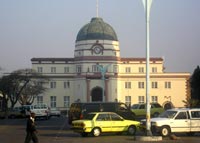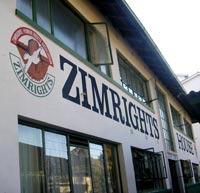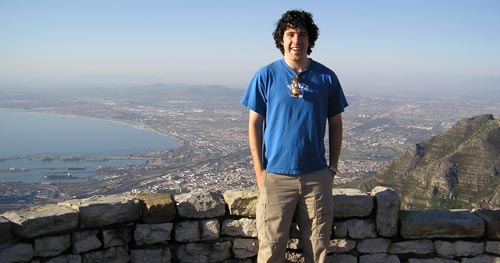Alliance for Southern African Progress (New York/Zimbabwe)
 This summer I had the privilege of working for the Alliance for Southern African Progress (ASAP), a small NGO located in New York City. ASAP is still in its initial phases (there were only four members when I arrived in May), but already it is establishing key networks and launching innovative and promising projects in relation to civil rights in Zimbabwe, a country that has been torn apart by the ruthless corruption of the Robert Mugabe government and his party, the ZANU-PF.
This summer I had the privilege of working for the Alliance for Southern African Progress (ASAP), a small NGO located in New York City. ASAP is still in its initial phases (there were only four members when I arrived in May), but already it is establishing key networks and launching innovative and promising projects in relation to civil rights in Zimbabwe, a country that has been torn apart by the ruthless corruption of the Robert Mugabe government and his party, the ZANU-PF.
Without question, the legal background I have attained over the past couple years was integral to my role this summer. I wrote several research briefs on the legal implications and validity (both constitutionally and internationally) of various pieces of legislation enacted by the Zimbabwean government, including the draconian Access to Information and Protection of Privacy Act (AIPPA), which requires the registration of all independent media carrying on business in Zimbabwe, and the similarly repressive Public Order and Security Act (POSA), which requires any public gatherings to be authorized by the police. I also wrote a brief on the proposed NGO Bill, which would require virtually all NGOs to be registered with a governing body comprised primarily of ZANU-PF appointees, as well as banning foreign funding (which, practically speaking, means all funding) of all human rights-related NGOs; this bill could well bring civil society in Zimbabwe to a crashing halt.
 Yet despite all of my law-related work, ASAP's biggest project of the summer, one that will be ongoing for many months further, was the Zimbabwe Freedom Charter project. The idea is to emulate a project initiated by the African National Congress some fifty years ago, a project which united and galvanized the opposition movement in apartheid South Africa. In conjunction with several leading NGOs on the ground in Zimbabwe, ASAP will work to solicit information from the Zimbabwean populace as to what they would like to see in a free and well-governed Zimbabwe of the future. This information can pertain to absolutely anything, from improved labour standards to electoral reform to better schooling in rural areas. After the period of collecting information has expired, the information will be consolidated by the participating NGOs into a document expressing the will of the people, known as the Freedom Charter. Ultimately, the contents of the Charter will be discussed and ratified by the NGOs, as well as other concerned members of the public, at a public meeting (what was known in the South African example as the Congress of the People). The Charter will then be distributed publicly, and used as the basis for a nationwide petition demanding change in Zimbabwe. The project's aim is to coincide with the lead-up to the 2005 parliamentary elections, which are scheduled for March and could well determine the fate of Zimbabwe's future.
Yet despite all of my law-related work, ASAP's biggest project of the summer, one that will be ongoing for many months further, was the Zimbabwe Freedom Charter project. The idea is to emulate a project initiated by the African National Congress some fifty years ago, a project which united and galvanized the opposition movement in apartheid South Africa. In conjunction with several leading NGOs on the ground in Zimbabwe, ASAP will work to solicit information from the Zimbabwean populace as to what they would like to see in a free and well-governed Zimbabwe of the future. This information can pertain to absolutely anything, from improved labour standards to electoral reform to better schooling in rural areas. After the period of collecting information has expired, the information will be consolidated by the participating NGOs into a document expressing the will of the people, known as the Freedom Charter. Ultimately, the contents of the Charter will be discussed and ratified by the NGOs, as well as other concerned members of the public, at a public meeting (what was known in the South African example as the Congress of the People). The Charter will then be distributed publicly, and used as the basis for a nationwide petition demanding change in Zimbabwe. The project's aim is to coincide with the lead-up to the 2005 parliamentary elections, which are scheduled for March and could well determine the fate of Zimbabwe's future.
 I spent the bulk of the summer working on the formulation of this project, which culminated with my visit to Zimbabwe in late July (with stops in London, Cape Town and Johannesburg along the way). My purpose there was to meet with representatives of Zimbabwean NGOs to present the Freedom Charter proposal and seek support for the project. Some of the NGOs I made contact with included the National Constitutional Assembly, the Zimbabwe Election Support Network, the Legal Resources Foundation, and the Association of Women's Clubs. My experience there gave me insight into the difficulties surrounding coordination of large projects in Zimbabwean civil society. Because of the violence and intimidation brought to bear by the Mugabe government against any form of dissent, NGOs tend to keep their operations rather secretive, and are hesitant to engage in any large movement. However, progress continues to be made, and ASAP has invited me to go back to Zimbabwe with them in the fall, an invitation I do not intend to pass up.
I spent the bulk of the summer working on the formulation of this project, which culminated with my visit to Zimbabwe in late July (with stops in London, Cape Town and Johannesburg along the way). My purpose there was to meet with representatives of Zimbabwean NGOs to present the Freedom Charter proposal and seek support for the project. Some of the NGOs I made contact with included the National Constitutional Assembly, the Zimbabwe Election Support Network, the Legal Resources Foundation, and the Association of Women's Clubs. My experience there gave me insight into the difficulties surrounding coordination of large projects in Zimbabwean civil society. Because of the violence and intimidation brought to bear by the Mugabe government against any form of dissent, NGOs tend to keep their operations rather secretive, and are hesitant to engage in any large movement. However, progress continues to be made, and ASAP has invited me to go back to Zimbabwe with them in the fall, an invitation I do not intend to pass up.
My time in Zimbabwe was at once extraordinary and depressing. Zimbabwe is an incredibly beautiful country, with a remarkable blend of mountains, countryside, lakes, waterfalls and of course, wildlife. But it is also a country that openly demonstrates the scars of the tyranny that has plagued it over the last several years. Rich farmland lays barren and burning, the result of greed and maladministration that characterized the much-maligned land redistribution program. Unemployment sits at approximately 80%, which is visibly evident in the streets of Harare, lined with people having nothing to do except maybe sell the occasional bag of oranges. Armed guards and police are everywhere, ready to follow through on any intelligence they receive regarding work being done by the opposition. Hundreds of makeshift homes lie just outside the city center without services of any kind. Inflation is exponential; the exchange rate was 5000-1 with the US dollar when I arrived; less than two weeks later, it was 7000-1. Hearing Zimbabweans talk about the magical country that once really puts things in perspective, but brings me further motivation to continue on the arduous journey toward securing some form of good governance. Perhaps when I return to Zimbabwe, some positive changes will be underway.


 This summer I had the privilege of working for the Alliance for Southern African Progress (ASAP), a small NGO located in New York City. ASAP is still in its initial phases (there were only four members when I arrived in May), but already it is establishing key networks and launching innovative and promising projects in relation to civil rights in Zimbabwe, a country that has been torn apart by the ruthless corruption of the Robert Mugabe government and his party, the ZANU-PF.
This summer I had the privilege of working for the Alliance for Southern African Progress (ASAP), a small NGO located in New York City. ASAP is still in its initial phases (there were only four members when I arrived in May), but already it is establishing key networks and launching innovative and promising projects in relation to civil rights in Zimbabwe, a country that has been torn apart by the ruthless corruption of the Robert Mugabe government and his party, the ZANU-PF. Yet despite all of my law-related work, ASAP's biggest project of the summer, one that will be ongoing for many months further, was the Zimbabwe Freedom Charter project. The idea is to emulate a project initiated by the African National Congress some fifty years ago, a project which united and galvanized the opposition movement in apartheid South Africa. In conjunction with several leading NGOs on the ground in Zimbabwe, ASAP will work to solicit information from the Zimbabwean populace as to what they would like to see in a free and well-governed Zimbabwe of the future. This information can pertain to absolutely anything, from improved labour standards to electoral reform to better schooling in rural areas. After the period of collecting information has expired, the information will be consolidated by the participating NGOs into a document expressing the will of the people, known as the Freedom Charter. Ultimately, the contents of the Charter will be discussed and ratified by the NGOs, as well as other concerned members of the public, at a public meeting (what was known in the South African example as the Congress of the People). The Charter will then be distributed publicly, and used as the basis for a nationwide petition demanding change in Zimbabwe. The project's aim is to coincide with the lead-up to the 2005 parliamentary elections, which are scheduled for March and could well determine the fate of Zimbabwe's future.
Yet despite all of my law-related work, ASAP's biggest project of the summer, one that will be ongoing for many months further, was the Zimbabwe Freedom Charter project. The idea is to emulate a project initiated by the African National Congress some fifty years ago, a project which united and galvanized the opposition movement in apartheid South Africa. In conjunction with several leading NGOs on the ground in Zimbabwe, ASAP will work to solicit information from the Zimbabwean populace as to what they would like to see in a free and well-governed Zimbabwe of the future. This information can pertain to absolutely anything, from improved labour standards to electoral reform to better schooling in rural areas. After the period of collecting information has expired, the information will be consolidated by the participating NGOs into a document expressing the will of the people, known as the Freedom Charter. Ultimately, the contents of the Charter will be discussed and ratified by the NGOs, as well as other concerned members of the public, at a public meeting (what was known in the South African example as the Congress of the People). The Charter will then be distributed publicly, and used as the basis for a nationwide petition demanding change in Zimbabwe. The project's aim is to coincide with the lead-up to the 2005 parliamentary elections, which are scheduled for March and could well determine the fate of Zimbabwe's future. I spent the bulk of the summer working on the formulation of this project, which culminated with my visit to Zimbabwe in late July (with stops in London, Cape Town and Johannesburg along the way). My purpose there was to meet with representatives of Zimbabwean NGOs to present the Freedom Charter proposal and seek support for the project. Some of the NGOs I made contact with included the National Constitutional Assembly, the Zimbabwe Election Support Network, the Legal Resources Foundation, and the Association of Women's Clubs. My experience there gave me insight into the difficulties surrounding coordination of large projects in Zimbabwean civil society. Because of the violence and intimidation brought to bear by the Mugabe government against any form of dissent, NGOs tend to keep their operations rather secretive, and are hesitant to engage in any large movement. However, progress continues to be made, and ASAP has invited me to go back to Zimbabwe with them in the fall, an invitation I do not intend to pass up.
I spent the bulk of the summer working on the formulation of this project, which culminated with my visit to Zimbabwe in late July (with stops in London, Cape Town and Johannesburg along the way). My purpose there was to meet with representatives of Zimbabwean NGOs to present the Freedom Charter proposal and seek support for the project. Some of the NGOs I made contact with included the National Constitutional Assembly, the Zimbabwe Election Support Network, the Legal Resources Foundation, and the Association of Women's Clubs. My experience there gave me insight into the difficulties surrounding coordination of large projects in Zimbabwean civil society. Because of the violence and intimidation brought to bear by the Mugabe government against any form of dissent, NGOs tend to keep their operations rather secretive, and are hesitant to engage in any large movement. However, progress continues to be made, and ASAP has invited me to go back to Zimbabwe with them in the fall, an invitation I do not intend to pass up.